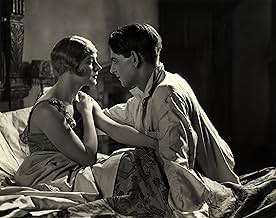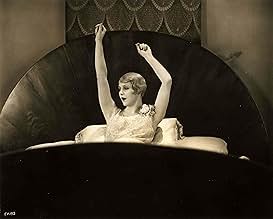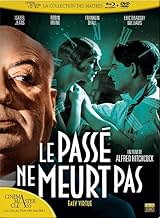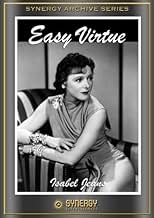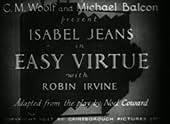AVALIAÇÃO DA IMDb
5,4/10
3,2 mil
SUA AVALIAÇÃO
Adicionar um enredo no seu idiomaA recently divorced woman hides her scandalous past from her new husband and his family.A recently divorced woman hides her scandalous past from her new husband and his family.A recently divorced woman hides her scandalous past from her new husband and his family.
- Direção
- Roteiristas
- Artistas
Enid Stamp-Taylor
- Sarah
- (as Enid Stamp Taylor)
Alfred Hitchcock
- Man with Stick Near Tennis Court
- (não creditado)
Benita Hume
- Telephone Receptionist
- (não creditado)
Ben Webster
- Justice Halstead
- (não creditado)
- Direção
- Roteiristas
- Elenco e equipe completos
- Produção, bilheteria e muito mais no IMDbPro
Avaliações em destaque
I occasionally watch a silent film.I do find it very frustrating when actors are mouthing words and we are expected to know what they are saying without benefit of intertwines. Byou far the best part of the film is the opening trial scene.After that it is all downhill and rather silly at that.Hitchin was capable of making stinkers egg Under Capricorn,and this was clearly one of them
"Easy Virtue" is an early and impressive Hitchcock in which the master displays a range of innovative filmic devices (such as the way we learn about a marriage proposal by watching the eavesdropping hotel switchboard operator rather than by seeing the man or woman talking on the phone).
The story is based on a play by Noel Coward and (contrary to the other posted IMDB comment on the film) I believe the movie is excellent. The solo organ score on the videotape I watched was absolutely stunning.
The film tackles a range of issues relating to divorce that would become taboo after adoption of the Production Code in 1934. Our heroine Larita is married to a drunken brute. After he catches her almost (but not quite) being seduced by the artist who has been painting her picture, he brings suit for divorce. Adultery is the only ground for divorce in England at this time and we see a gripping trial scene in which the jury has to decide whether to believe Larita's denials. Of course, the jury can't see beyond its Victorian preconceptions (if she's alone with him all day, of course they've slept together) and it finds her guilty.
Now a disgraced woman of "easy virtue," Larita takes to the Riviera where she ensnares a rich young suitor (after he hits her in the eye with a tennis ball). Unfortunately, she doesn't tell him about her checkered past and naturally Larita's family hates her on sight.
This story takes on a range of highly relevant divorce issues. The film skillfully lampoons the absurdity of fault divorce and the need to try questions of adultery to a jury. It takes quite seriously the way that society treated a divorced woman as damaged goods. It attacks the sexual double standard with zeal and skewers the stuffy English aristocracy to great effect. After 1934, divorce didn't exist in the movies (except in comedies where the spouses remarry in the end) and the important legal and social issues raised by divorce and female sexuality were erased from the screen by the censors. Very few early films (silent or sound) ever dealt so candidly with the harsh realities of divorce; "Easy Virtue" compares favorably to the outstanding "One More River" (1934) in its straightforward and quite moving treatment of the issues.
The story is based on a play by Noel Coward and (contrary to the other posted IMDB comment on the film) I believe the movie is excellent. The solo organ score on the videotape I watched was absolutely stunning.
The film tackles a range of issues relating to divorce that would become taboo after adoption of the Production Code in 1934. Our heroine Larita is married to a drunken brute. After he catches her almost (but not quite) being seduced by the artist who has been painting her picture, he brings suit for divorce. Adultery is the only ground for divorce in England at this time and we see a gripping trial scene in which the jury has to decide whether to believe Larita's denials. Of course, the jury can't see beyond its Victorian preconceptions (if she's alone with him all day, of course they've slept together) and it finds her guilty.
Now a disgraced woman of "easy virtue," Larita takes to the Riviera where she ensnares a rich young suitor (after he hits her in the eye with a tennis ball). Unfortunately, she doesn't tell him about her checkered past and naturally Larita's family hates her on sight.
This story takes on a range of highly relevant divorce issues. The film skillfully lampoons the absurdity of fault divorce and the need to try questions of adultery to a jury. It takes quite seriously the way that society treated a divorced woman as damaged goods. It attacks the sexual double standard with zeal and skewers the stuffy English aristocracy to great effect. After 1934, divorce didn't exist in the movies (except in comedies where the spouses remarry in the end) and the important legal and social issues raised by divorce and female sexuality were erased from the screen by the censors. Very few early films (silent or sound) ever dealt so candidly with the harsh realities of divorce; "Easy Virtue" compares favorably to the outstanding "One More River" (1934) in its straightforward and quite moving treatment of the issues.
Easy Virtue is one of Hitchcock's interesting but not great films, that is neither among his best or worst. Not a terrible one but this is really not the master of suspense at his best. When it comes to his silent films, Easy Virtue is perhaps one of his weaker ones, with his best being The Lodger and his weakest being Champagne. It has a lot of good things. There are some very clever shots and Hitchcockian touches like in the opening courtroom scene with everything being shot like from the perspective of the judge through his monocle and the proposal over the phone showing only the reactions of the telephone operator. Hitchcock directs very well, though there is understandably the sense that he was still finding and developing his own style. The sets and costumes are lovely to watch, while Violet Farebrother plays her role with tremendous gusto and Isabel Jeans brings a lot of charm to hers. Robin Irvine is very bland though and the rest of the acting can feel rather overheated and exaggerated even with a silent melodrama. The characters do come across as stock and somewhat cardboard, there's little dimension to them and you don't really care for them either. The story is a let down, it begins brilliant and ends just as satisfyingly but there's half-an-hour at least of tedious melodrama and staid storytelling, the romance also lacks passion and you don't ever really feel the love between them. And some have made a good point about the benefits of having dialogue instead here, I have great appreciation for silent films but Easy Virtue was the sort of film being a comedy-social drama where dialogue would have helped it come alive. Overall, not terrible, not great, mixed view here if anything. 5/10 Bethany Cox
In Alfred Hitchcock's Easy Virtue, a woman has some explaining to do when the family of her second husband finds out there was a first husband. That's because back in the day, divorced women were considered damaged goods, and upstanding families would steer well clear of such flighty harlots. Easy Virtue's tagline asks "Can she be blamed for a past she didn't create?" And the answer is yes, because she did create her past when she started making eyes at the man painting her portrait. But perhaps I am getting a little ahead of myself.
Larita Filton (Isabel Jeans) is married to an unnamed guy. Well, he probably has a name, but the movie doesn't tell us. Anyway, they're rich, and she's having her portrait done by a professional artist. One day the artist notices marks on Larita's wrist, and she mentions that her husband sometimes drinks too much. Thus a relationship is born, at least as far as they went in the 1920s, which meant it's possible Larita and the artist smooched once. Anyway, one fine day the husband comes home to find the two of them in an embrace. A gun is presented, and a shot is fired, and the artist dies. This is all told to us in flashback at the divorce trial, where the jury quite naturally finds in favor of the husband. Larita is shamed and shunned.
She finds herself chillaxing on the Mediterranean, and a chance encounter with a tennis ball leads Larita to meet John Whittaker (Robin Irvine), who's from a well-to-do family himself. They romance, yadda yadda, and soon they're wed. He brings her home to meet his parents and his two sisters for dinner. The stern matriarch is fairly sure she recognizes Larita, and eventually she pieces it together. Haughty hilarity ensues.
This is a silent film, obviously very early in The Master's career, and much more of a melodrama than a thriller with a twist. There's no twist, and because there are few sight gags one must rely on the intermittent title cards to follow the mouthed dialog. That's all well and good, but there was just too much predictability afoot, and the quality of the print did the movie no favors, either. That all makes Easy Virtue a curio in Hitch's long, long career, and little more.
Larita Filton (Isabel Jeans) is married to an unnamed guy. Well, he probably has a name, but the movie doesn't tell us. Anyway, they're rich, and she's having her portrait done by a professional artist. One day the artist notices marks on Larita's wrist, and she mentions that her husband sometimes drinks too much. Thus a relationship is born, at least as far as they went in the 1920s, which meant it's possible Larita and the artist smooched once. Anyway, one fine day the husband comes home to find the two of them in an embrace. A gun is presented, and a shot is fired, and the artist dies. This is all told to us in flashback at the divorce trial, where the jury quite naturally finds in favor of the husband. Larita is shamed and shunned.
She finds herself chillaxing on the Mediterranean, and a chance encounter with a tennis ball leads Larita to meet John Whittaker (Robin Irvine), who's from a well-to-do family himself. They romance, yadda yadda, and soon they're wed. He brings her home to meet his parents and his two sisters for dinner. The stern matriarch is fairly sure she recognizes Larita, and eventually she pieces it together. Haughty hilarity ensues.
This is a silent film, obviously very early in The Master's career, and much more of a melodrama than a thriller with a twist. There's no twist, and because there are few sight gags one must rely on the intermittent title cards to follow the mouthed dialog. That's all well and good, but there was just too much predictability afoot, and the quality of the print did the movie no favors, either. That all makes Easy Virtue a curio in Hitch's long, long career, and little more.
I will admit that at times this movie seems slow. However, if you take a look deeper at the time frame in which this movie was presented you can easily see the risk that Hitchcock took. In the movie the main character is divorced and disgraced by her horrible husband. When she tries to regain some normalcy by marrying again, the ghosts of her past come to prevent any happiness in her future. Once again she is shamed, disgraced, and helpless prey for the photographers and newspapers who use her high social standing and demise to sell their goods.
A very compelling look into hypocrisy and judgment in a time when both were at their highest peak.
A very compelling look into hypocrisy and judgment in a time when both were at their highest peak.
Você sabia?
- CuriosidadesAlfred Hitchcock: Walking past a tennis court carrying a walking stick.
- Erros de gravaçãoWhile sitting with Larita after she is hit with the tennis ball, John's sitting position changes between shots.
- Citações
[last lines]
Larita Filton: [to news photographers] Shoot! There's nothing left to kill.
- Versões alternativasThere is an Italian edition of this film on DVD, distributed by DNA Srl: "SOTTO IL CAPRICORNO (Il peccato di Lady Considine, 1949) New Widescreen Edition + FRAGILE VIRTÙ (1927)" (2 Films on a single DVD, with "Under Capricorn" in double version 1.33:1 and 1.78:1), re-edited with the contribution of film historian Riccardo Cusin. This version is also available for streaming on some platforms.
- ConexõesFeatured in Hitchcock/Truffaut (2015)
Principais escolhas
Faça login para avaliar e ver a lista de recomendações personalizadas
- How long is Easy Virtue?Fornecido pela Alexa
- What happened to the artist?
- Why does the print look so bad?
- Why is the music so bad?
Detalhes
- Tempo de duração1 hora 20 minutos
- Mixagem de som
- Proporção
- 1.33 : 1
Contribua para esta página
Sugerir uma alteração ou adicionar conteúdo ausente

Principal brecha
By what name was Mulher Pública (1928) officially released in Canada in English?
Responda
